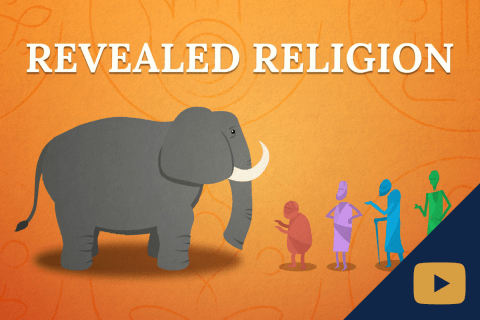
If God has revealed himself definitively to humanity, the sensible thing to do is receive that revelation and live accordingly. Otherwise, we are left to find our way as best we can.
We humans are naturally and understandably interested in whether there is a spiritual realm, whether there is a God or gods who inhabit it, and what upholds the existence and meaning of the visible world. Such questions touch us deeply, and the answers at which we arrive have important practical questions.
There are three basic responses we can make to the important question of the existence of God. One response is to determine that there is no God and no spiritual world. Sometimes a less decisive version of this stance is taken, with one asserting that there is no way for us to discover a potentially existing spiritual world, and that the questions of the spiritual world do not make any difference in how we live. This non-theistic conclusion has been a minority response to the question of God’s existence over the centuries among various human cultures; nevertheless, this conclusion has been around for a long time and has had undeniably intelligent and compelling proponents. Beyond those who explicitly assert this position, there have likely always been a larger number of people who, although they have found it uncomfortable or inconvenient to deny the spiritual realm, have nonetheless behaved as though they had. This position is being noted here only to set it aside for now. The interest here is in another set of responses.
The other two possible responses to the questions raised above are what can be called theistic. They each hold that there is a God or gods and an invisible world. Where they differ is in their answer to a simple and straightforward question: has God (or the gods) revealed himself to the human race definitively, authoritatively, and universally, in a manner addressed to all people? Has God spoken concerning matters of great importance to us? Has he taken the initiative to let us know something of himself and of spiritual reality that we could not otherwise have discovered? Those who answer this question in the affirmative go one way, and those who find no such universal revelation by God go another.
If we believe that God exists and want to learn more, the first question to ask is whether God has spoken. To take a limping analogy: if we were interested in the existence of intelligent life on other planets and came to the conclusion that such life did indeed exist, the first question we would ask is whether any representatives of that intelligent life form had contacted us. If it could be shown that an alien race had been in touch with us or with some group of people among us, and further that they had communicated something to us about who they were and what their intentions toward us were, it would only be rational to begin by considering their communications and treat them accordingly. If there were no signs of such contact, we would be left to seek other sorts of evidence as to their nature, whereabouts, and attitudes (if any) toward us.
Something similar is true in the case of God. If we think there is a God (or gods), the first thing we will want to ascertain is whether there has been an “official” communication to us. The idea that God, should he exist, might initiate some sort of communication with us is neither irrational nor silly. While such a communication is not a logical necessity, there is a certain fitness to it – it could be. Thus, if we want to learn more about God, we need to discover whether anyone has ever claimed to have received such a communication, and if so, determine whether the claim was credible. Many people have claimed to have seen UFOs and taken rides with aliens, but most of us are slow to believe them. Many people have claimed to bear messages from God to the world, and far fewer have been taken seriously.
...has God (or the gods) revealed himself to the human race definitively, authoritatively, and universally, in a manner addressed to all people?... Those who answer this question in the affirmative go one way, and those who find no such universal revelation by God go another.
With these considerations in mind, one simple fact begins to rise to the top: there has been only one instance in which an assertion that God has spoken clearly, definitively, publicly, and universally has been taken seriously by large numbers of people over a long period of time. This one claim is found in the religious history of the Jews. From the time of their Israelite origins, the Jews understood themselves to have been chosen by God – through no merit or fault of their own – to be the means by which he had decided to speak to the human race and to intervene in our history. The Jews claimed that a revelation had been made to them by God, and that revelation was ongoing, had clear content, was intended for “all the nations,” and involved them in an intimate and demanding relationship with God.
It may seem overly exclusive to say that the Jewish claim to possess a revelation for all humanity is the only one that the world has taken seriously – until we attempt to think of another. By such a reasonable standard, their claim is the only one on offer. Currently more than half the population of the world – all who identify as Jews, Christians, or Muslims – look to that revelation as the foundation of their faith. Admittedly, each of these groups has a different understanding of how that revelation was made, and therefore what its ultimate content is. Nevertheless, all three faiths are rooted in the Israelite experience and claim: they all hold that the God of Abraham, Isaac, and Jacob – the God of the Hebrews – is the Creator and Lord of the universe, and that he has definitively revealed himself and spoken and acted in the world concerning matters of the highest importance for our life and happiness.
As was noted above, the claim that God has definitively revealed himself is only one of the two possible theistic responses to the question of God’s existence. What about the other? If we arrive at the conclusion that there is a God and a spiritual realm but reject the claim that there has been a definitive and authoritative communication made by him to us, we find ourselves in another human and religious current including numerous religious traditions, some of which are highly sophisticated. Buddhism, the higher reaches of Hinduism, Neo-Platonism, Taoism, and to some degree Confucianism, come under this heading. These religions are not founded on the claim of a definitive revelation initiated by God; instead, they are the result of an impressive seeking-after God by humans. They are paths of enlightenment, ways of wisdom, attempts to get at the spiritual world by some special means. In these traditions, there are masters to follow, pioneers in the spiritual life – Siddhartha, Lao-Tzu, Confucius, Plato (for some of his followers) – spiritual titans who have found roads into the invisible world that others have been able to follow.
This basic attempt of categorizing the world’s major religions is not meant to reduce these varied and complex traditions into one lump, or to suggest that there are not important differences among them; rather, it is meant to highlight one important distinction between the religion of the Jews and the traditions of all these others. The Jews claimed to bring to the world a revelation, and their characteristic figure was the prophet, one who spoke the very word of God. These other religions, on the other hand, claim to bring to the world a way of wisdom or a path of enlightenment, and their characteristic figure is the wise man, the enlightened one, the spiritual master, the sage.
It may seem overly exclusive to say that the Jewish claim to possess a revelation for all humanity is the only one that the world has taken seriously – until we attempt to think of another. By such a reasonable standard, their claim is the only one on offer.
Important consequences follow logically from each of these stances: the way in which one responds to a revelation initiated by God and the way in which one views a path of enlightenment discovered by humans will necessarily differ. A famous story among Buddhists and Jains that tells of a group of blind men and their encounter with an elephant gets at this difference. Here is one rendition of the tale as told by the Buddha:
Such a story fits well in the context of human searching; however, it becomes illogical in the context of a divine revelation. If God has definitively spoken about something, then it is silly at best to dispute the matter. One might reasonably question whether God actually said it or whether the messenger got the message right, but if once it was clear that God had spoken, the only sensible human response would be to receive the communication and attempt to act upon it.
Thus, we arrive back at the decisive question of whether God has revealed himself definitively to humanity. If he has – as Christians hold – then the sensible thing to do is to receive the revelation gratefully and try to understand it. If he has not, then we are left to find our way as best we can.
Christianity claims – and has always claimed – to be a revelation from God to the human race. This claim is its foundation and serves as its whole reason for being listened to. The claim runs through the whole of the Bible and animates the whole of Christian history. The letter to the Hebrews begins with an assertion that is apparent on every page of Scriptures: “In many and various ways God spoke of old to our fathers by the prophets; but in these last days he has spoken to us by a Son, whom he appointed the heir of all things, through whom also he created the world” (Hebrews 1:1-2). Jesus makes the same claim himself: “No one knows the Son except the Father, and no one knows the Father except the Son, and anyone to whom the Son chooses to reveal him” (Matthew 11:27).
Just as the Buddha’s story of the blind men and the elephant characterizes a sensible approach to a non-revelation religion, so the warning offered by John at the end of the Book of Revelation expresses the rational response to a God-given message: “I warn everyone who hears the words of the prophecy of this book: if anyone adds to them, God will add to him the plagues described in this book, and if anyone takes away from the words of the book of this prophecy, God will take away his share in the tree of life and in the holy city, which are described in this book” (Revelation 22:18-19). What would be presumptuous and out-of-place in a Buddhist understanding becomes reasonable and even necessary in a Christian one. What would be tolerant and humane according to a Buddhist vision becomes foolish and even reprehensible in a Christian one. All turns on this one question: has God definitively spoken?
One reason for pursuing a distinction is that there are currently many in our world who call themselves “Christians,” but who deny the revelation foundation of Christianity, without which the whole Christian view of the world ceases to make sense. Such people tend to approach the Scriptures and the words of Jesus as if they were living in a Buddhist world, as if there had been no revelation and Christianity were simply one path of human searching among many with no special authority behind it.
If Christianity is not a special and decisive revelation of God to the whole human race and Jesus is not the unique Word of the Father, and furthermore if the prophetic tradition, the idea of a Chosen People and a Savior Messiah, and the notion of a Sacred Scripture and a Church through which God speaks authoritatively to humanity are all erroneous, then the entire thing constitutes a mistake from start to finish. If that is the case, then the only proper response is to have nothing to do with it, and the only sensible thing to do would be to call it what it is – the biggest and most preposterous deception ever perpetrated on the human race – and then move on to better things. However, those who deny the revelational character of Christianity generally fail to take such an approach. Their attitude would be justifiable if the Judeo-Christian tradition were merely a record of human striving after God, a repository of spiritual pathways and practices, a storehouse of wisdom to be culled in the never-ending search for the divine. This is precisely what the four-thousand-year history of Judaism and Christianity is not. Rather, that history and tradition is a God-initiated revelation to the human race (or it is a cheat). It is the decisive intervention of God in human history for the saving of humanity, or it is a pack of lies and a manipulative power-grab.
Thus, we arrive back at the decisive question of whether God has revealed himself definitively to humanity. If he has – as Christians hold – then the sensible thing to do is to receive the revelation gratefully and try to understand it. If he has not, then we are left to find our way as best we can. In the latter case, however, we should have the clarity of mind to see that we are no longer Christians in any meaningful sense, as we no longer hold the central Christian claim, thus saving ourselves and others much confusion.
Further Reading
- Rev. Kenneth Baker, SJ, "Vatican II on Divine Revelation"
- Rev. Dave Endres, "Has Revelation Ended?"


